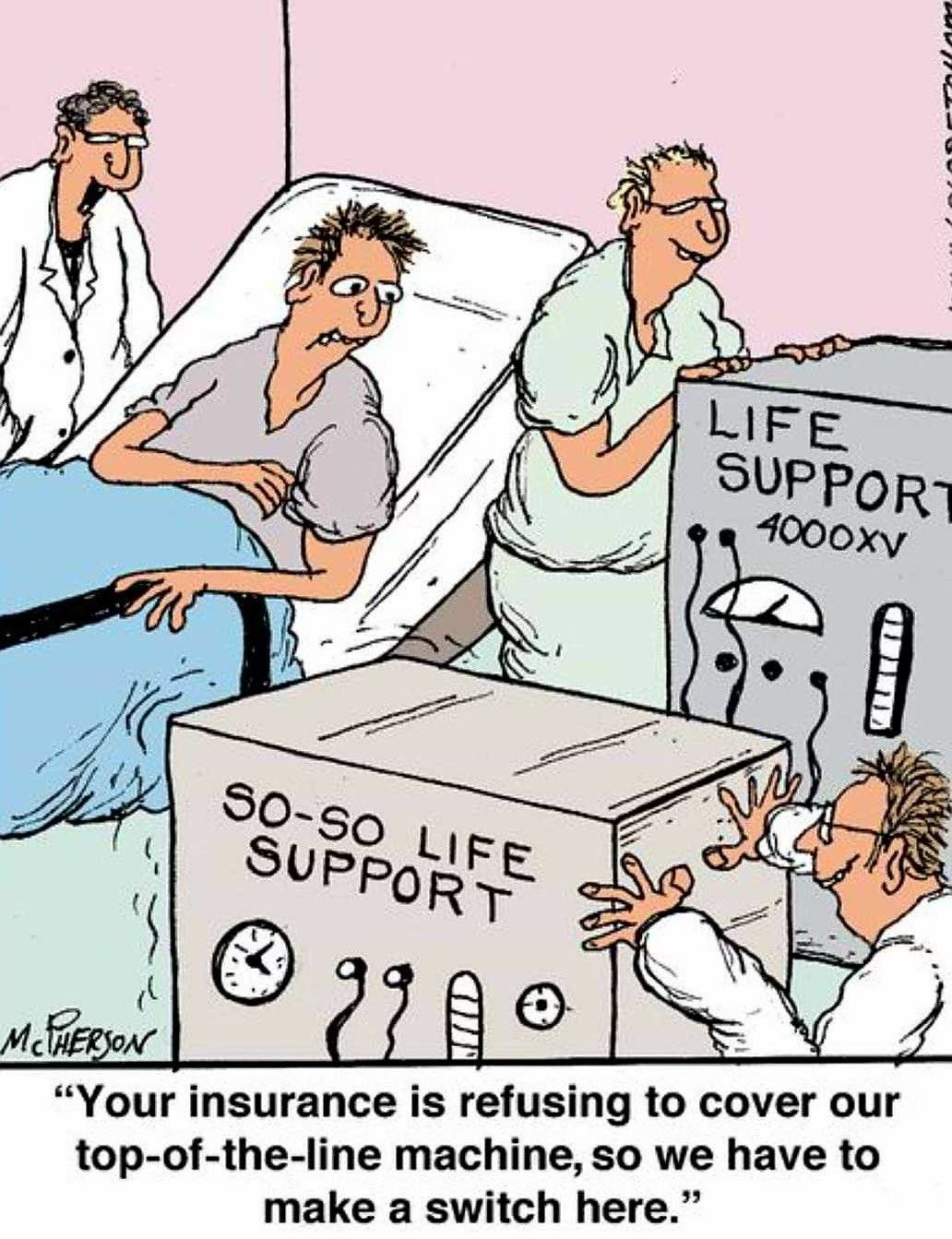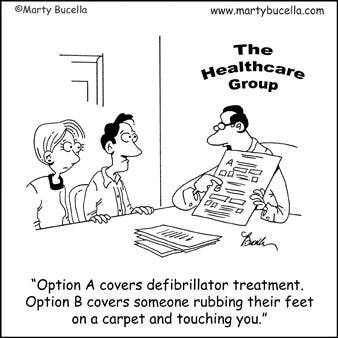The recent shooting of UnitedHealthcare CEO Brian Thompson, and the public gloating about it, prompted a raft of responses from columnists. Many of those responses scolded the people who were gloating and effectively exonerated Thompson from responsibility for the many miseries caused by health insurance companies. I sample and comment on three of the many columns that made similar points, as a way of introducing my own new column. To be clear, nothing justifies gloating about someone’s murder, no matter their job or ownership of pressing social problems and of course murder is always wrong.
The Washington Post editorial board argued that Thompson’s shooting is not an appropriate starting off point for talking about problems with American health insurance because it’s a complex issue: “We’re skeptical that this particular moment lends itself to nuanced discussion of a complicated, and heavily regulated, industry.” But if not now, when? The label “heavily regulated” also implies that insurance companies are struggling to survive amid burdensome government rules, when the companies are actually quite profitable. In 2023, for example, UnitedHealth Group earned profits of $22 billion, according to Forbes. Calling American health insurance “heavily regulated” further begs the question of, heavily regulated compared to what? In countries with national health care systems, the profits, prices, and coverage of their services all tend to actually be heavily regulated to keep care as affordable as possible for all citizens.
Megan McArdle, a columnist at The Washington Post argued that the people celebrating Thompson’s shooting are a small embittered minority out of touch with actual life: “To return to the question of ‘Why does the health-care system derange so many people?’— the answer is that it doesn’t. It deranges a handful of folks who have mistaken social media for the real world. It would be better if all of them…put down their phones and had more contact with reality.” Her statement is striking in its condescension, but also confusing since people’s struggles with the unfairnesses and cruelties of health insurance companies are common enough that they have become memes and fodder for cartoonists. Google “Health insurance cartoons” and your computer screen will fill with examples like the one below.
She also says that 92% of Americans have health insurance, as if that’s an accomplishment. But what is the real world like for the 8% of Americans who don’t have insurance? As you’ll read in my column, not having health insurance makes it more likely that someone will die of treatable diseases. That’s a pretty harsh reality for the 25 million people in the U.S. who lack insurance coverage.
The New York Times published an opinion column by UnitedHealth Group CEO Andrew Witty, effectively Thompson’s boss, who said that everyone in their organization is working to do what’s best for patients: “We understand and share the desire to build a health care system that works better for everyone. That is the purpose of our organization.” He may actually believe that, but he also earned $22 million dollars in 2023, close to one dollar for every American who does not presently have health insurance.
Witty makes a revealing comment near the end of his column, when he says that Thompson focused on giving people the health care options they desired: “He believed decisions about health care should start with the individual and championed plans in which consumers could see costs and coverage options upfront, so they could decide what’s best for themselves and their families.” This is coded language for hiding the sometimes brutal reality behind people’s insurance plans, because the problem is, people don’t know what health care coverage is “best for themselves” until they need it: when they get diagnosed with cancer, have a heart attack, or get hit by a car and suffer massive trauma. If they haven’t paid upfront for coverage of the very expensive care they need, it may only be available to them at a high price or may not be available at all.
Read my column on this subject and tell me what you think.
Cancer Nursing Today
It’s undeniably a tragedy when someone is murdered, shot down, while doing nothing more than living their life, as happened to United Healthcare CEO Brian Thompson on the morning of December 4th in Manhattan. I’m emphasizing that Thompson’s death is a tragedy, because social media has reportedly been awash in celebrations of his murder. Gloating over a public shooting and death is unacceptable, full stop, but I, and probably other nurses, find the anger understandable. People are infuriated about the state of health care in the U.S. and specifically at how corporate greed has, in so many ways, broken our health care system. The suspect in the shooting, Luigi Mangione, chose to publicly kill a health care CEO using bullets with the words “deny,” “defend” and “depose” written on their casings. It’s important to understand the broader festering rage that Mangioni’s crime has revealed.
I introduce five facts below as background to understanding the public’s anger.
In other news, our time in Chile is winding down. My daughter S. just arrived and we are all going to Northern Patagonia for a week before flying back to the US. We will be home for Christmas!
Hugs to all and my warmest wishes for the holidays,
Theresa








Theresa happy holidays !! You look on top of the world ! What a rush !! Hope you are soaking all that goodness up !
You look like you are !!!
Cheers and safe travels
Excellent , thought provoking writing !!love it!!!
Always
My best
Mimi
Thank you for writing this excellent and important column. Our family has received excellent health care in four countries that provide universal coverage—Czechia, Switzerland, the UK (for our son), and France (after a bad fall from an e-bike while on vacation). These four countries have four different systems, ranging from government-funded single payer (the UK) to fully private, with no government insurance at all (Switzerland). But what unites them is that healthcare is exclusively nonprofit. Even in Switzerland, all the insurance companies are private nonprofits and are strictly regulated.
I think this is the key difference between the crappy system in the US and the mostly functional systems everywhere else in the developed world. The profit motive is far too corrupting: it skims off money that ought to go to care and hands it over to rich shareholders instead; incentivizes doctors to run unnecessary tests, perform unnecessary procedures, and prescribe unnecessary drugs in order to make money; causes hospitals to lie about which treatments are covered, leaving patients stuck with outrageous bills; and pushes insurance companies to deny legitimate claims in order to save money.
On another note, those are fantastic pictures from Easter Island. What an adventure!